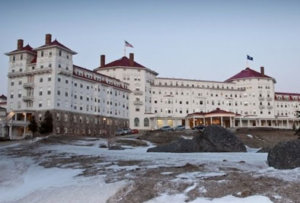The Tea Party protesters agree on the form if not the substance. The academics take seriously the title of the meeting “Crisis and Renewal: International Political Economy at the Crossroads” and its brief:
The 1944 conference was, famously, largely an Anglo-American affair, whereas today’s reconstruction must engage the larger European Union, as well as the emerging economies of Eastern Europe, Latin America, and Asia. In the years since the 1944 conference, the globalization of production, trade, and especially finance, has transformed our economy, but has not yet transformed our system of regulation or our tools of policy intervention. Indeed, our very habits of thought and speech lag behind the realities that we desperately need to think and speak about.
The program announces a desire to think and talk big, policy and reform for the planet, and the venue, Mount Washington Resort, suggests an even grander vision of what might be achieved. There is abundant mentions to Keynes (we started counting but then gave up). Some of the Keynesian referencing is thoughtful and substantive, but most of the order of the great moral example offered by the great Englishman, as Skidelsky once wrote in “Exemplary Lives” (you can find it in Times Literary Supplement 75 (19):1250)). INET appears sincere in its desire to bring history into the discussion of a crisis of economics, they are funding programs to foster the teaching of the subject, and a grant program to pursue its research, but in these meetings, history was relegated to the dinner party anecdote and to a construction of identity and legitimation. This is a media, visual, video, audio, blogging event (in which I am participating), to project the brand of the Institute and associate it with a glorious past, and the prestige of great past thinkers.
I suffer from an embarrassing Pavlovian conditioning, every time I hear the words “history repeats”, I blurt out Marx (Karl not Groucho):
Hegel says somewhere that all great historic facts and personages recur twice. He forgot to add: “Once as tragedy, and again as farce.”
Here we start at 7 am, and dinner talks go past 10 pm. Lack of sleep and high altitude are pressing me to a brutish mood, a Hunter S.Thompson fiendishness, fear and loathing state of mind. And I start howling for tragedy.
I don’t much mind the spectacle particularly when it is giving me access to folks that would otherwise never have spoken to us were we not wearing a “Staff” badge. I got a +30 min video interview with Brad DeLong, and I am in the shot. The real test of these meetings for me, and for those that want to see an effort at changing economics, was yesterday’s session by the Teaching Task Force. Two committees reported on INET proposals for reform of the economics curriculum. The UK group under the influence of Skidelsky parroted his calls for economic history. Not much progress in a year, he said the same at the Cambridge meeting and earlier still. I was left wondering what Skidelsky sees as economic history, and what benefits one might extract, all is left floating in self evident confidence. The US group had a better worked out vision, setting out plans to use INET online resources to provide materials to reach classrooms (the impact issue module). However, the US group’s suggestion of anthologies of texts, as alternative to textbooks, seems a weak attack on the textbook market. I was wondering if it was an appeal to the canon, that has crashed and burned in Literature and will never have a chance in Economics. It is likely that the teaching reform committee could not agree, to argue for substantive change you need to agree that economics needs changing, and that consensus is skidding down the slopes.
The weight of the 1920s decorated rooms, and the grey presence of so many headliners of the economics profession (which we are making the most of with the interviewing) is creating great confusion about what is “new” in New Economic Thinking. One line is nostalgia and it began with the opening session when Rogoff recalled with regret and humor how as a young man he was unengaged by C. Kindleberger’s teachings. (Its ok now, he recovered the notes.) Another is memory, that the models of past authors should not be so easily forgotten. But the strongest line is that we need more economic history in curricula and in public debate, and the example to follow is… Rogoff and Reinhardt’s This Time is Different? Not wanting to question their achievement, the book affords only the most weak defenses of historical scholarship, where time is flattened into a tractable dataset and agency and institution are dismissed by the law of great numbers. More worryingly this take on history does not question the place of the economist in the historical scene (that sociology thing again). In a trope that I saw repeated thrice, it was said that economics is at a stage where a Copernican revolution has occurred but one needs still to use Ptolomeic cosmology for a few decades more, for policy advice (the argument without celestial spheres has been made before the crisis, in 2006, in G. Mankiw’s “Economist as Engineer” piece to the JEP).
None of this is new, and worse still, none of it is very critical. New Economic Thinking is hard to win. For nearly a century philanthropic money tried to steer economics into interdisciplinarity and social and historical consciousness, in the 1970s they gave up (Floris will disagree, but despite the cases of behavioral economics I think the argument holds). And because change is so hard, there is a danger that INET gives up, and becomes a left of center think tank to argue the policy wars. The task of producing knowledge against the grain requires imagination. I would have wished to see the big headliners back to back with some new ideas from INET grantee portfolio. I would have wished more collaborative work and less staging speeching. I would have wished more time for debate and critique. I would have wished less farce and more tragedy.




